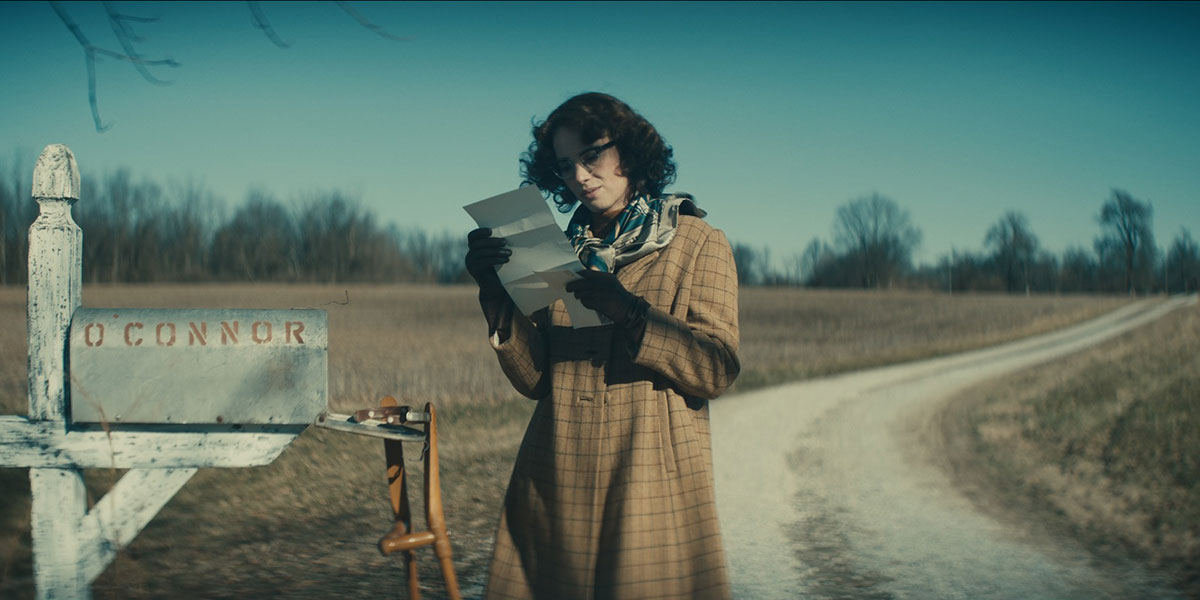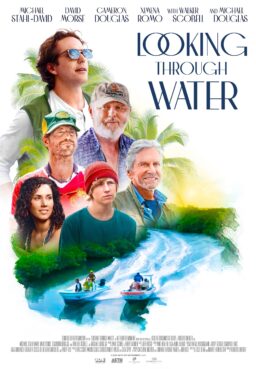There’s an interesting dynamic wherein artists are often fascinated by the lives and processes of other artists. It’s probably both the act of witnessing a kindred spirit and a desire to elevate the aspect of the human condition that produces timeless creativity. This habit led to three of the films I saw this year at TIFF being about three of the most influential writers of all time: Flannery O’Connor, Hunter S. Thompson, and Virginia Woolf. Who wouldn’t love to eavesdrop on a conversation between those three? Two of these films work. The third should have gotten a rewrite.
The best of the two actor-directed bio-docs is Ethan Hawke’s “Wildcat,” a film that unpacks a formative chapter in the life of the incredible Flannery O’Connor, played by his daughter Maya (star of “Stranger Things” and recently so good in “Asteroid City“). Hawke has profiled artists before in directorial efforts like “Blaze” and “Seymour: An Introduction,” but this feels like his most ambitious drama, a movie that doesn’t just hit events in the life of its subject but digs deep into what influenced her work. Maya Hawke proves she can carry a film—even if her father’s introduction that claimed she’s already a better actress than him felt like a lovable exaggeration—in a drama that should definitely appeal to fans of O’Connor’s work and likely make a few new ones.
Hawke opens with a fantastic quote from O’Connor: “I’m always irritated by people who imply that writing fiction is an escape from reality. It is a plunge into reality.” He clearly used that as an artistic guidebook, making a film that alternates a part of the young author’s biography with visions brought to life through her writing. The structure allows the Hawkes to subtly draw parallels from Flannery’s life to her vivid characters, amplified further by the fact that actors recur. For example, Laura Linney plays Flannery’s mother and often appears as characters in the fiction brought to life for a lot of the film, making it clear how much the young lady used the people around her in (barely) exaggerated form in her fiction. It’s not make-believe—it’s a plunge into reality.
Hawke surrounds his daughter with performers who can support her without stealing focus, including crucial roles for “First Reformed” co-star Philip Ettinger and Linney and extended cameos from Steve Zahn, Alessandro Nivola, and Cooper Hoffman. They’re all great and well-directed by an increasingly confident director of performance.
O'Connor’s short stories, at least the ones she wrote at this point in her life, center on self-interested men and obtuse women who act selfishly as if it were the word of God. It’s a heady mix of sex, religion, and rebellion. What I admire most about “Wildcat” is how Hawke doesn’t try to explain O’Connor as much as embed her authorial obsessions into his work. He’s such a consistently fascinating performer and creator. “Wildcat” is just further proof.

Another powerful creator from Hawke’s generation is Patricia Arquette, who segues from a phenomenal on-camera career to her first turn behind the camera with “Gonzo Girl,” based on the book by Cheryl Della Pietra. It’s curious that Arquette has chosen a project about a young woman who gets caught up in the egocentric sphere of a man increasingly becoming a caricature of himself, given how many powerful personalities she’s been around in her notable career. Like many actors-turned-directors, Arquette is good with performance but can’t quite get her arms around a clunky script, one that allows its inconsistent characters to get sucked into the vortex of its larger-than-life central personality. I adore Arquette, and this freshman effort changes nothing about that, but it’s a misfire that I hope she overcomes with a stronger sophomore outing soon.
“Gonzo Girl” is one of those odd biopics that’s not really a biopic. Likely for estate reasons, the central figure here has been renamed from Hunter S. Thompson to Walker Reade (Willem Dafoe), but it is undeniably the man who found fear and loathing in Las Vegas. Camila Morrone (“Daisy Jones & the Six”) plays Alley Russo, an aspiring writer who gets a gig as the assistant to Reade, a gun-toting, drug-snorting lunatic who has reached the point of his career (in the early ‘90s) in which he’s become a joke. The founder of gonzo journalism has to give the gonzo nuts what they need, including the groupies who circle him, hanging on his every word and encouraging his worst behavior. Alley doesn’t play his game, which earns his admiration, of course. And it leads to SO much drug use.
The problem is that Alley Russo is just too inconsistent to have an impact. It’s not Morrone’s fault—she’s a future star with the right part—but the script here forces Alley to give lip service to her own identity but then largely just respond to the latest bad behavior from Walker. She ends up being his babysitter, lover, muse, and friend. And none of it lands as believable.
The best thing about “Gonzo Girl” is how much Arquette adores Dafoe’s face, keeping her camera in close-up for long scenes, recognizing that it’s one of the best in movie history. Hunter S. Thompson would have loved it.

Finally, here’s a film that’s not really about a famous author and yet totally is at the same time. Paul B. Preciado’s “Orlando, My Political Biography” includes numerous details about the life of Virginia Woolf, but it’s reflected through both the masterpiece Orlando and how much that work has impacted the trans community. This clever documentary uses Orlando to reflect on the brilliance of Woolf’s life and work and how it has stayed alive through the people it influenced. There are so many Orlandos. Preciado wants you to meet a few of the most memorable ones. You won’t forget them.
Preciado, a famous critic and curator, was asked to write about his transition and identity and chose Woolf’s Orlando as a lens through which to do so. He interviews trans people with very different stories but filters them through both the plot of Woolf’s book and her own life. The result is a blend of humanist documentary storytelling about modern searches for identity with the elements of character that Woolf explored in her literature. It’s a reflection that works back and forth from art to reality, blending the two to give greater power to both.
Preciado’s film can sometimes be overly precious and manufactured, but it’s more often a joyous celebration of life and art. He brings together these wonderful trans and non-binary people and has them act out parts of the novel while then giving them space to reveal details about their own journeys. It’s such a brilliant concept that any stumbles in execution are easy to overlook. Art that is as vital as Virginia Woolf’s Orlando is never really dormant—it’s just waiting for the next storyteller to embrace it.












